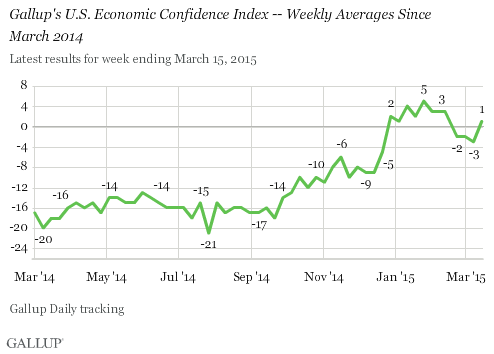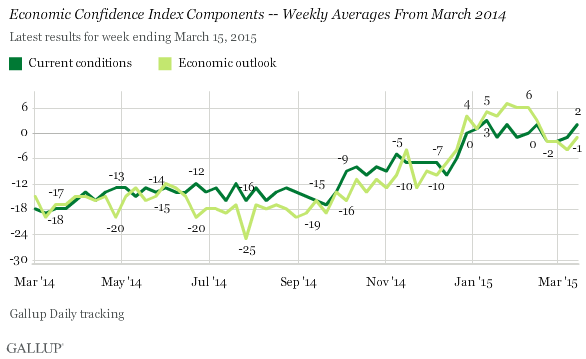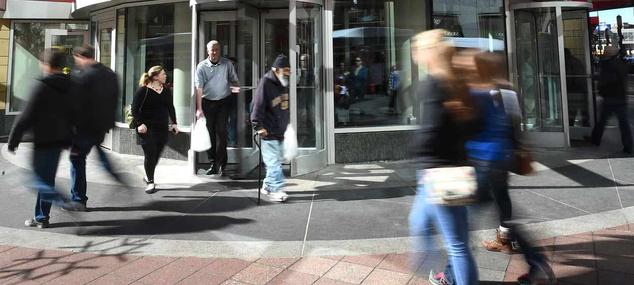Story Highlights
- Economic Confidence Index climbs to +1
- Index had been negative for the previous three weeks
- Index rose four points from the week prior
WASHINGTON, D.C. -- Gallup's weekly Economic Confidence Index reached positive territory again, climbing to +1 for the week ending March 15. The index had been negative during the previous three weeks after it spent nearly two months in positive territory

The Economic Confidence Index increased four points last week, after measuring -3 the week before. Apart from the three recent weeks with negative index scores, the index has been positive since late December, the first time it entered positive territory. This included a high of +5 for the week ending Jan. 25, the highest weekly score since Daily tracking began in 2008.
Gallup's Economic Confidence Index is the average of two components: Americans' views of current economic conditions and their perceptions of whether the U.S. economy is getting better or getting worse. The theoretical maximum for the index is +100, if all Americans say the economy is excellent or good and getting better. The theoretical minimum is -100, if all Americans say the economy is poor and getting worse.
Both components of the index improved by three points last week. Americans remain slightly more optimistic about current economic conditions (+2, based on 29% rating conditions as "excellent" or "good," compared with 27% "poor") than they do about the outlook for the economy (-1, based on 47% saying the economy is "getting better" and 48% saying it is "getting worse"). For most of January and February, Americans' outlook for the economy was more positive than their rating of current conditions.

Bottom Line
Gallup's Economic Confidence Index was back on the positive side for the week ending March 15, after three weeks in negative territory. Part of Americans' optimism, particularly as it relates to the health of the U.S. economy currently, may be rooted in the positive jobs reports from the U.S. Labor Department, and the strength of the U.S. dollar -- especially when compared with the euro.
Gallup has previously demonstrated that economic confidence increased as the price of oil, and thus the price of gas at the pump, decreased. The recent fluctuations in confidence may also reflect changes in the average price of gas across the country, which had been rising since early February but fell last week.
Survey Methods
Results for this Gallup poll are based on telephone interviews conducted March 9-15, 2015, on the Gallup U.S. Daily survey, with a random sample of 3,545 adults, aged 18 and older, living in all 50 U.S. states and the District of Columbia. For results based on the total sample of national adults, the margin of sampling error is ±2 percentage points at the 95% confidence level. All reported margins of sampling error include computed design effects for weighting.
Each sample of national adults includes a minimum quota of 50% cellphone respondents and 50% landline respondents, with additional minimum quotas by time zone within region. Landline and cellular telephone numbers are selected using random-digit-dial methods.
Learn more about how Gallup Daily tracking works.

